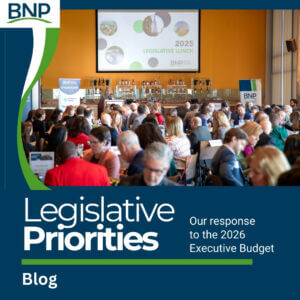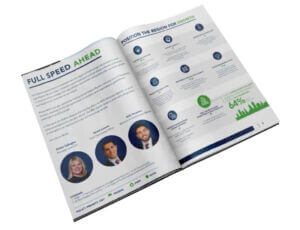9.7.21 Advocacy Alert: Hochul Triggers HERO Act – Employer Checklist
Blog Categories
September 7, 2021

What Happened?
Yesterday, Governor Kathy Hochul designated COVID-19 as a “highly contagious communicable disease,” citing rising case numbers and concerns about the delta variant. This declaration is significant because it triggers the NY HERO Act.
In June, former Governor Andrew Cuomo signed the NY HERO Act, which mandated infectious disease prevention protocols for all employers in New York. Employers must have a plan on hand, but do not need to follow these protocols unless a public health emergency is declared.
Cuomo issued an emergency declaration in March 2020, and he allowed it to expire on June 24, 2021. However, as Hochul took office, she faced pressure from lawmakers to make the declaration to trigger the HERO Act. The BNP and many others discouraged this decision.
Employer Checklist
The BNP recommends taking the following steps to comply with the NY HERO Act under this new emergency declaration:
- Utilize BNP resources (see below) to understand the NY HERO Act.
- Develop an Airborne Infectious Disease Exposure Prevention Plan for your workplace (template HERE, state standards HERE). Employers were required to adopt a plan by August 5. If you have not yet finalized yours, do so as soon as possible. The state created industry-specific templates for agriculture, construction, delivery services, domestic workers, emergency response, food service, manufacturing and industry, personal services, private education, private transportation, and retail (available at the bottom of the page here). Employers in all other industries should use the general template.
- Distribute your adopted plan to all employees. The law requires distribution of the plan within 30 days of adoption. The plan should be distributed in writing, posted at each worksite, and added to the employee handbook. Employers should also do a verbal review of the plan with employees.
- Abide by your plan throughout the duration of the emergency declaration. By following your plan and immediately correcting violations, you can keep your employees and customers safe and minimize your liability.
Disclaimer: This checklist is for informational and educational use only, and should not be considered legal advice. Legal advice is based on the specific facts of a client’s situation and must be obtained by individual consultation with a lawyer.
Where Can I Learn More?
The BNP has developed many resources to help employers understand the NY HERO Act.
We hosted two virtual episodes in which experts explained what the law means for employers. You can view the presentations and slides below:
- #1 The Basics of the HERO Act (with Barclay Damon)
- #2 Understanding and Implementing Prevention Standards (with Goldberg Segalla)
A summary of the HERO Act can be found here.
Related Posts
Legislative priorities: BNP’s reaction to the Executive Budget
On February 14, we set the stage for critical discussions about the future of New York State’s economy by convening regional business leaders and policymakers, along with BNP members, at the 1970 Club in KeyBank Center for our Legislative Luncheon.
2025 Advocacy Agenda: Shaping the future
On Jan 9, our signature Government Affairs event unveiled the strategies and priorities that will guide our work this year with policymakers.
Expert panel talks collaboration as key to tech hub future
Buffalo Niagara Partnership President & CEO Dottie Gallagher was a recent guest on M&T Bank’s CommunityLIVE to discuss the tech hub and what it means for the region moving forward.
BNP hosts NYS Assembly committee roundtable on the future of tech
The Buffalo Niagara Partnership, TechBuffalo and Microsoft hosted the New York State Assembly Science & Technology Committee for a roundtable discussion focused on equity, workforce and skilling for the tech future.




